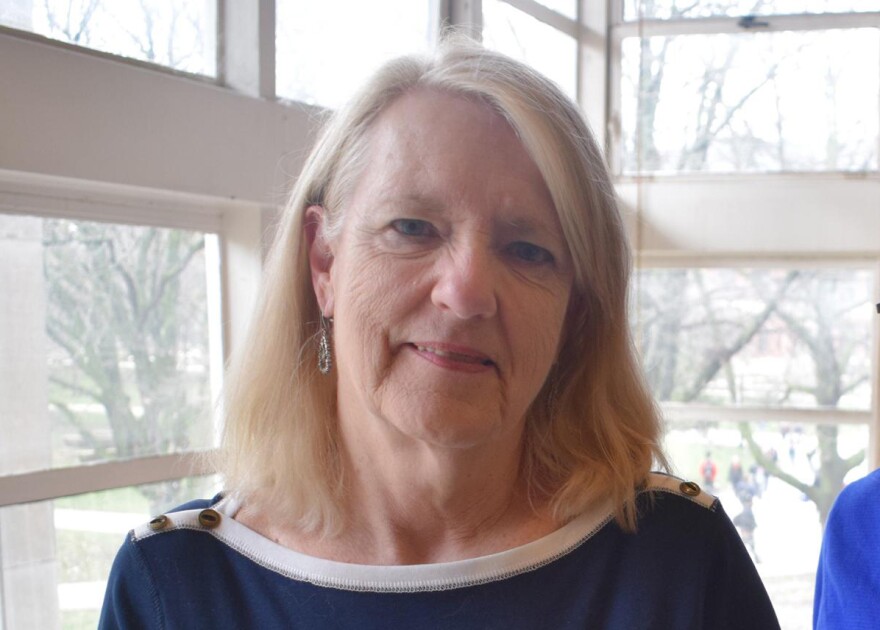The McLean County Law and Justice Center is an important place. It’s where our community hashes out the way we treat each other, and how the system treats all of us.
But the courthouse is an intimidating place, with strict rules, locked doors, and hard-to-access files. We need a guide, and for the last 12 years, we’ve had Edith Brady-Lunny.
She's the courts reporter at The Pantagraph. And she’s retiring Friday.
In 20 years with The Pantagraph, Brady-Lunny has developed relationships not just with prosecutors, police, judges, and lawyers. She also regularly bumps into the people she’s written about on the street, like the cat lover she featured in a documentary she co-produced about mental health and the justice system.
"People need to understand that when they lose their local media, they're losing their local watchdogs."
“I just saw him about a week ago, and he was really proud to tell me it’s been three years since he’s been in any trouble,” Brady-Lunny said. “People, they don’t forget you when you follow them for a long period of time. You really develop a connection with them.”
Mental health has been a major focus of Brady-Lunny’s coverage in the past decade, starting with former McLean County Sheriff Mike Emery calling her over to see how crowded his makeshift mental health unit had become at the jail. Her subsequent reporting helped spark a major shift in our how the county deals with mental health. It’s now a model among downstate communities.
Brady-Lunny wasn’t just a passive observer to the issue. Years earlier she served on two mental health boards in her own community in DeWitt County.
“So I’ve had some experience with the struggles for agencies with funding, and also the struggles that people have in getting services in the community,” she said. “I had that background.”
Brady-Lunny said there are still misperceptions in the public about the justice system works. Cases move slower than people think, she said, pointing to the four years between Kirk Zimmerman’s arrest on murder charges and his subsequent acquittal. (Brady-Lunny will appear on an episode of NBC’s “Dateline” on Monday about the Zimmerman case. She was interviewed by Keith Morrison.)
“You really have to sit in the courtroom for as many hours and days as I have with a case, in order to understand that process,” Brady-Lunny said.
She also serves as the media coordinator for the Eleventh Judicial Circuit, which includes McLean County. She helps reporters get access for high-profile cases, such as the Zimmerman trial, now that the Illinois Supreme Court has made permanent its Cameras in the Courtroom program.
There have been 30 to 40 cases where cameras have been allowed locally, she said.
“That makes a huge difference for the public because we’ve been able to show them as well as tell them what happens. No matter how good a writer you are, there’s nothing like seeing the testimony, seeing photographs of the people as they’re testifying, to really shine a light of transparency on how the court system operates,” Brady-Lunny said.
Before starting at The Pantagraph as a correspondent, Brady-Lunny ran a weekly newspaper in DeWitt County and worked in journalism in California and Michigan. She recently wrote her first book with co-author Steve Vogel, about the Clinton Lake drownings in 2003.
Brady-Lunny said she's really concerned about the state of local media.
“We’ve seen the loss of about 65% of our jobs in the last few years in the news media in this country. And there’s a variety of reasons for that. The advertising dollars are now going to the big social media giants, instead of to the local radio stations, TV stations, and the newspapers. And the problem with that is, as their budgets shrink at these local news outlets, the public is also losing its connection to the news media.
“And people need to understand that when they lose their local media, they’re losing their local watchdogs. And there won’t be anybody left to keep an eye on the local city or county governments, and even their justice system,” she said.
People like you value experienced, knowledgeable and award-winning journalism that covers meaningful stories in Bloomington-Normal. To support more stories and interviews like this one, please consider making a contribution.



